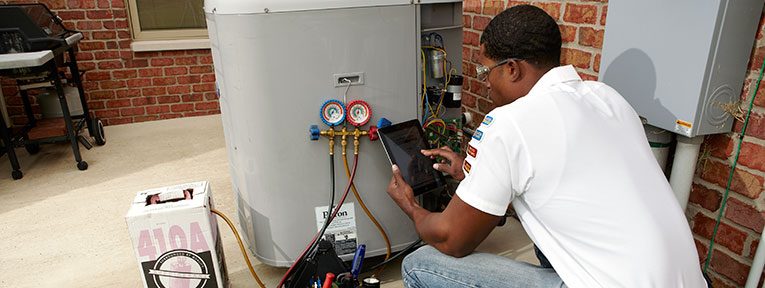
Comparing Refrigerants Side-by-Side
One of the hottest discussions (pardon the pun) within the air conditioning and heating industry is the difference between two refrigerants – R-22 and R-410A. As a homeowner considering a purchase, it’s important that you understand the difference so you can make the best decision for your system. We’ve outlined below the main differences and why they matter.
R-22
- Often referred to by a brand name like Freon®
- As of 2010, R-22 was discontinued for use in new air conditioning systems
- R-22 is a hydro-chlorofluorocarbon (HCFC) which contributes to ozone depletion
R-410A
- Often referred to by a brand name like Puron®
- Has been approved for use in new residential air conditioners
- Is a hydro-fluorocarbon (HFC) which does not contribute to ozone depletion
- Will become the new standard for U.S. residential air conditioning systems in 2015

Compare R-22 and R-410A refrigerants
Performance Differences
Newer air conditioning models are designed to be used with R-410A for reliable and more efficient operation. Because R-410A can absorb and release more heat than R-22, your air conditioning compressor can run cooler, reducing the risk of compressor burnout due to overheating.
R-410A also functions at a higher pressure than R-22, so new compressors are built to withstand greater stresses, reducing the chance for cracking. If you were to put R-410A refrigerant into a system designed for R-22, the pressure would be too much and the unit would break.
All air conditioners use an oil to keep the compressor lubricated during operation. R-22 air conditioners use mineral oil and R-410A systems use synthetic oil. The synthetic oil is generally more soluble with R-410A than mineral oil is with R-22. This means the R-410A system operates more efficiently reducing wear and tear on the compressor.
Dry Charging
While R-22 was outlawed in 2010 for use in new units, some companies are taking advantage of the law by producing what’s known as ‘dry charge’ units. These are new units that don’t have the refrigerant installed at the factory. Instead, a technician is required to come out to your home and install the R-22 refrigerant. While this practice is technically legal, this isn’t the best option for the following reasons:
- There is a limited supply of R-22 and its price will increase as supplies diminish
- R-410A offers greater efficiency, saving you in energy costs, and is much better for the environment
- Dry charged units typically offer much shorter warranty periods
What have you heard about these two refrigerants? We can help give you unbiased answers!
Related Articles
HVAC Glossary of Terms


